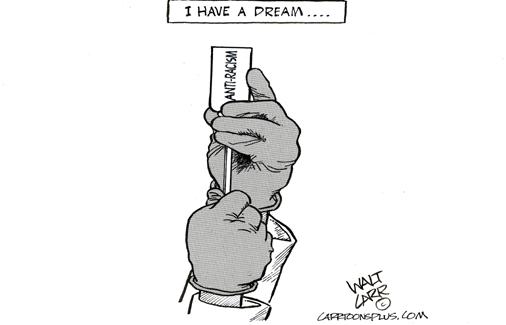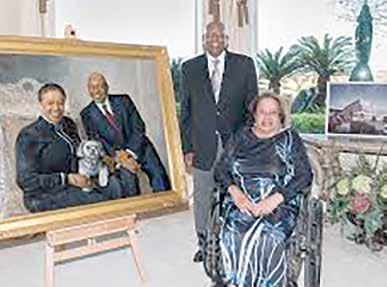OPINIONS/EDITORIALS
EDITORIAL
Political Affiliation is the Wrong Way to Guarantee the Right to Vote
In all but six states, the 2021 legislative sessions have begun. And already state lawmakers have introduced hundreds of bills aimed at election procedures and voter access – far greater than the number of voting bills introduced by this time last year. But many believe this rash of bills to be more about partisanship than streamlining the process of equal access to the right to vote as guaranteed by the Constitution. In a backlash to historic voter turnout in the 2020 general election and based on a plethora of foundationless and racist allegations of voter fraud and election irregularities, legislators have introduced three times the number of bills to restrict voting access as compared to this time last year. Twenty-eight states have introduced, pre-filed or carried over 106 restrictive bills this year, compared to 35 such bills in 15 states on Feb. 3, 2020). American electoral politics has been dominated by two major political parties since shortly after the founding of the republic. Since the 1850s, they have been the Democratic Party and the Republican Party. Since the last major party realignment in the mid-20th century, the Democratic Party has been the center-left and liberal party while the Republican Party has been the center-right and conservative party. Since the 1990s, both the Republican and Democratic parties have shifted further apart. However, this two-party system is based on laws, party rules and custom, not specifically outlined in the U.S. Constitution. Several third parties also operate in the U.S., and from time to time elect someone to local office. The largest third party since the 1980s has been the Libertarian Party. Besides the Constitution, Green, and Libertarian parties, there are many other political parties that receive only minimal support and only appear on the ballot in one or a few states. But it should be noted that the need to win popular support in a republic led to the American invention of voter-based political parties in the 1790s. Party realignments have recurred periodically in response to social and cultural movements and economic development. Ironically, the United States Constitution is silent on the subject of political parties. The Founding Fathers did not originally intend for American politics to be partisan. In Federalist Papers No. 9 and No. 10, Alexander Hamilton and James Madison, respectively, wrote specifically about the dangers of domestic political factions. In addition, the first President of the United States, George Washington, was not a member of any political party at the time of his election or throughout his tenure as president. He hoped that political parties would not be formed, fearing conflict and stagnation, as outlined in his Farewell Address. But following the 2020 elections in which we saw an unprecedented numbers of voters casting their ballots by mail, legislators across the U.S. have shown particular interest in absentee voting reform, with most bills aimed at altering absentee voting procedures in some way. Other bills would seek to modify how presidential electors are allocated or seek to adopt the national popular vote compact. In reviewing the more restrictive bills, 28 states seek to: limit mail voting access; impose stricter voter ID requirements; limit successful pro-voter registration policies; and enable more aggressive voter roll purges. These bills are an unmistakable response to the unfounded and dangerous lies about fraud that followed the 2020 election. Americans should not yield to partisanship or follow the tide of baseless allegations. Voting should be made easier for citizens – all citizens – not made more difficult. WI
Celebrate Women in March for Life-Time Achievements March is Women’s History Month, which places the spotlight on women and celebrates their achievements. It is a time to recognize women breaking glass ceilings, beating down doors and pushing away barriers to progress. It is the month to raise awareness that women are growing in their determination not to let anything hold them back. This month marks 30 years since Congress passed the law authorizing the establishment of Women’s History Week. It was not until 1987 that Congress voted to designate March as Women’s History Month and approved the president’s decision to proclaim it. Women did not need a designation or approval to make a difference in the U.S. or around the world. And 2020 proved to be an outstanding year of progress. Women assumed leadership roles in every sector previously denied them. Many did so despite additional barriers, including nationality, ethnicity, gender pref-
TO THE EDITOR Pandemic's Lost Ones Not Forgotten Rest in peace to the over 500,000 people in the U.S. who died from COVID-19 and the countless people around the world. I always wonder if this pandemic could've been prevented if we had competent leadership a year ago. May we learn from the mistakes that were made.
Take It to the Bridge I love the cover of last month's issue of the WI Bridge. Whoever the artist is, shout to them. It was just genius to have Marvin Gaye with the Howard Theatre as the backdrop. Shout out to all the creatives and artists. Brittany Logan Washington, D.C.
Constance Taylor Washington, D.C.
erence, age, disability, language, faith, or whatever issues others may have put in their way. Some of these women are familiar, while others are not well known. Still, we celebrate them and name a few of them, including Kamala Harris, the first woman U.S. vice president. Sarah McBride, the first openly-transgender woman elected to Congress. Jennifer King, first Black woman Washington Football Team NFL coach. Cori Bush, first Black woman representative to U.S. Congress from Missouri. Bianca Smith, the first Black woman pro baseball coach. Dr. Namandjé Bumpus, the first Black woman department chair at Johns Hopkins Medical School. NASA Astronaut Jeanette Epps, the first Black woman to join an International Space Station Crew. Nia DaCosta, the first Black woman to direct a Marvel Universe film. Tamara
WWW.WASHINGTONINFORMER.COM / THE WASHINGTON INFORMER
Moore, the first Black woman to serve as head coach of a men’s college basketball team. Ngozi Okonjo-Iweala, the first woman and first African director-general of the World Trade Organization. Rashida Jones, the first Black woman to run a major cable news network, namely MSNBC. Where women are not pursuing positions for themselves but decide to organize on behalf of others, they win. Ask President Joe Biden. With women leading, policies impacting women are expected to change, as well. It is partly the reason for them being there. Just as Black people don’t believe a blind eye should be given to public policy impacting Black people, women expect a gender-sensitive approach to public policies that affect women. That’s why Women’s History Month matters. WI
MARCH 4 - 10, 2021 25




